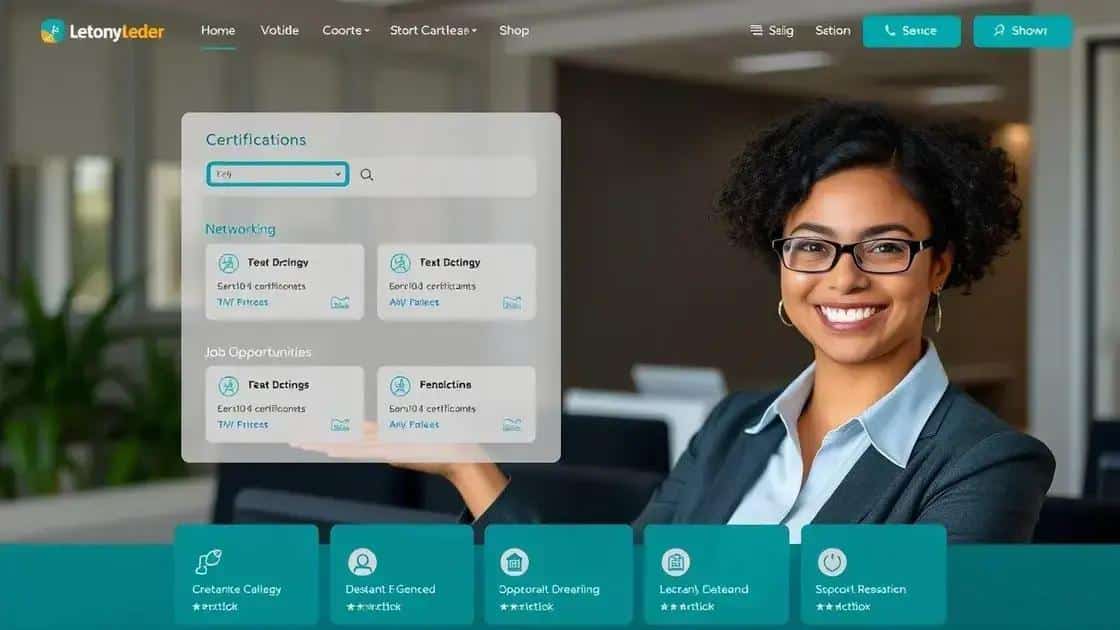Insights on student skill certifications: Boost your career

Skill certifications are essential for validating expertise, enhancing job prospects, and increasing earning potential, making them vital for career advancement in competitive markets.
Insights on student skill certifications are vital in today’s competitive job market. As education evolves, these certifications provide a tangible way for students to showcase their abilities and stand out to employers. Have you considered how they might enhance your career prospects?
Understanding skill certifications
Understanding skill certifications is crucial for students aiming to enhance their career prospects. These certifications validate the competencies and knowledge students acquire throughout their education. As you explore this topic, consider how they can open doors to job opportunities and provide a competitive edge in the job market.
What are Skill Certifications?
Skill certifications are formal recognitions awarded to individuals who demonstrate a specific level of expertise in a particular area. They range from general to specialized certifications. Choosing the right type can greatly influence your career path.
Benefits of Skill Certifications
There are several advantages to obtaining a skill certification. Here are key benefits:
- Enhances your resume and makes it stand out.
- Demonstrates your commitment to professional growth.
- Validates your skills to potential employers.
- Increases earning potential and job opportunities.
Additionally, acquiring certifications can lead to personal growth. By mastering new skills, you will feel more confident and capable. This added confidence can overflow into your professional demeanor.
It’s also important to recognize that different industries place varying levels of importance on certifications. For instance, tech-focused fields often prioritize these credentials, while others might emphasize experience. Researching your field’s requirements can help you understand their significance better.
Ultimately, skill certifications not only enhance your knowledge base but also show your dedication to your profession. As you navigate your career, keep in mind the necessity of staying updated with industry standards and pursuing relevant certifications.
Understanding skill certifications can significantly impact your career trajectory. Consider the possibilities they present and how they align with your professional goals.
The importance of skill certifications

The importance of skill certifications cannot be overstated in today’s job market. These certifications serve as proof of your acquired skills and knowledge, making you a more attractive candidate to employers. Understanding their significance can help you make informed decisions about your education and career.
Why Certifications Matter
Certifications can provide a competitive advantage. They often highlight your dedication to your field. Employers look for individuals who pursue additional training to stay current in their profession.
Key Advantages of Skill Certifications
Here are some key advantages of earning these credentials:
- Increases job opportunities by standing out among other candidates.
- Validates your competencies in specific areas.
- Can lead to higher salaries and promotions.
- Shows your commitment to lifelong learning.
Furthermore, certifications help bridge gaps between academic learning and real-world application. They demonstrate that you possess not only theoretical knowledge but practical skills as well. This combination is critical in various industries, particularly those that are constantly evolving.
As you consider which certifications to pursue, think about your career goals. Different fields value specific certifications. Research the standards and expectations within your industry. Aligning your certification choices with job requirements enhances your employability and career trajectory.
In essence, the importance of skill certifications lies in their ability to validate your skills, open doors to new job opportunities, and increase your earning potential. Emphasizing your certifications during job searches can significantly impact your success.
How to choose the right certification
Choosing the right certification can be overwhelming due to the many options available. However, making an informed decision is essential for aligning your career goals with your educational path. Understanding your personal interests and industry needs plays a critical role in this process.
Assess Your Career Goals
Begin by identifying your career aspirations. What position do you envision for yourself? This clarity will help narrow down the certifications that align with your goals. Understanding where you want to be in your career can guide your certification choices.
Research Industry Requirements
Diving into the specifics of your desired industry can provide insight into which certifications are respected and valued. Look for common qualifications mentioned in job postings. Here are key points to consider:
- Identify the most sought-after skills by employers.
- Check if there are any mandatory certifications for your target job.
- Consider the reputation of the certification provider.
- Evaluate the cost and time commitment required for each certification.
Additionally, networking with professionals in your field can give you firsthand knowledge about the certifications that have helped them succeed. Engaging in discussions can provide valuable insights into the certification landscape.
Another essential factor is your learning style. Some individuals prefer online courses, while others benefit from in-person training. Recognizing your preferred method of learning can help you choose a certification program that is best suited for your needs.
Finally, look at the long-term benefits of the certification. Some certifications may help you enter your desired field, while others can help you advance. Weighing these factors will allow you to choose a certification that fits not just your current situation but also your future aspirations.
Maximizing benefits of certifications

Maximizing the benefits of certifications requires a strategic approach. It’s not just about earning the badge; it’s about how you leverage it in your career. Understanding this can help you make the most of your investment.
Utilize Certifications on Your Resume
Once you achieve a certification, be sure to include it prominently on your resume. Highlighting it correctly can catch the attention of potential employers. Here are some tips:
- List certifications in a dedicated section.
- Include the date of certification.
- Give a brief description of what the certification entails.
- Show how the certification applies to the job you are seeking.
When applying for jobs, make sure to tailor your resume to highlight certifications relevant to the position. This targeted approach demonstrates your suitability and commitment.
Network with Industry Professionals
Networking can amplify your certification’s impact. Connecting with professionals in your field can open many doors. Through networking, you can learn about job openings, industry trends, and valuable contacts.
Participating in industry events or online forums can boost your visibility. Engage with other certified professionals to exchange ideas and resources. Consider joining professional associations related to your certification to expand your network.
Moreover, sharing your certification achievements on platforms like LinkedIn can enhance your professional online presence. Let people know about your credentials and how they prepare you for specific roles.
Finally, keep your skills fresh. Participate in ongoing education or renew your certifications when necessary. Staying up-to-date will ensure you remain competitive in a rapidly changing job market and can fully maximize the benefits of your credentials.
In conclusion, navigating the world of skill certifications can greatly enhance your career and create new opportunities. By understanding the importance of these certifications, choosing the right ones, and maximizing their benefits, you can stand out in the job market. Remember to invest time in researching your options, networking with professionals, and staying updated in your field. Making strategic moves with your certifications can lead you to a brighter professional future.
FAQ – Frequently Asked Questions about Skill Certifications
What are the main benefits of obtaining skill certifications?
Skill certifications validate your skills, improve job prospects, and can lead to higher salaries and positions.
How do I choose the right certification for my career?
Consider your career goals, industry requirements, and personal interests when selecting a certification.
How can I effectively showcase my certifications on my resume?
List your certifications in a dedicated section with dates and descriptions to attract potential employers’ attention.
What role does networking play in maximizing certification benefits?
Networking helps you connect with industry professionals, share knowledge, and learn about job opportunities related to your certifications.






